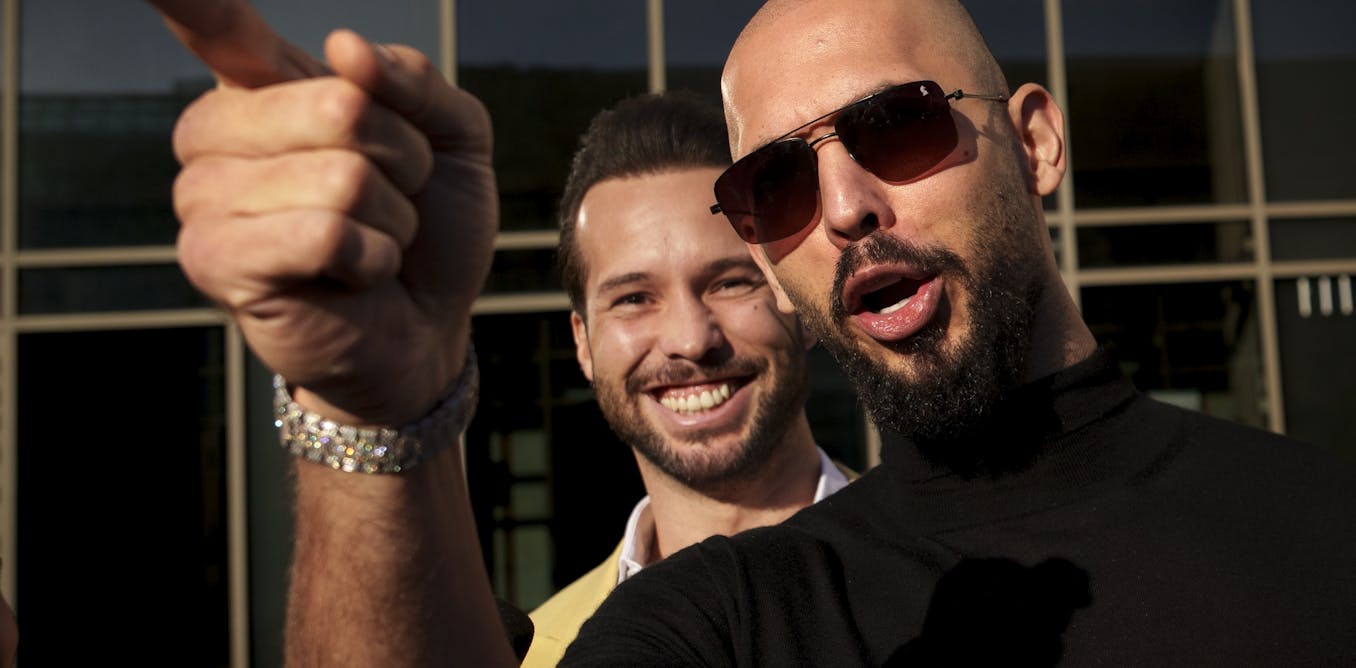British prosecutors have this week charged social media influencer Andrew Tate with a string of serious sexual offences, including rape and human trafficking, alleged to have been committed in the United Kingdom between 2012 and 2015.
This comes in the wake of an ongoing case in Romania. There, Tate and his brother Tristan face similar charges of coercing and exploiting women through what is sometimes described as the “loverboy method” of manipulation that is used to control and monetise women through webcam performances.
A self-described misogynist, Tate is a widespread figure of notoriety for his views on women and his role in the internet “manosphere”. He has millions of followers globally, including ten million on X alone.
This latest round of prosecutions will likely further entrench the loyalty of those followers: boys and young men who will see their leader as the victim of a corrupt system.
Who is Andrew Tate?
Tate is a British-American social media influencer and former kickboxer. He gained international notoriety for his violently misogynistic videos and pronouncements.
He’s built a massive, loyal social media following through a brand that is part provocateur, part self-help guru and part conspiracy theorist.
His rhetoric emphasises an aspirational masculinity geared towards extreme wealth and a physically fit body, combined with resentment towards women and so-called “feminised” societies. He has, for example, stated that women should “bear responsibility” for sexual assault.
Tate is a leading ideological figurehead of what is often called the “manosphere” – a loose network of online communities and content creators who promote regressive ideas about masculinity, gender roles and male identity.
Tate offers a template for many boys and young men to make sense of their place in the world, playing up ideas that boys are disenfranchised by social, economic, or cultural change.
This is part of an emotional hook that provides belonging and clarity in a world his followers are told is stacked against them.
Tate’s content involves both overt and, more often, insidious celebration of harmful gender norms and misogynistic ideologies.
Research has found boys’ exposure to this content has contributed to a resurgence of a sense of male supremacy in classrooms. This then increases sexism and hostility towards women teachers and girl peers.
Reinforcing the narrative
Given this context, it is unlikely the new charges will erode his popularity.
To be clear, he is not universally admired. In fact, the majority of boys reject what he stands for.
However, for the significant minority who comprise his hardcore followers, these new charges will likely be used to reinforce a persecution narrative.
In this way, Tate has paved the way for more violent and extreme misogyny to become standard, not rare.
This was exactly the pattern when the Romanian charges first emerged. His followers flooded platforms with hashtags like #FreeTopG, reframing his arrest as proof that he was “telling the truth” and being punished for it.
Figures like US President Donald Trump provide a relevant comparison. Trump has faced multiple criminal indictments and was found liable in a civil trial for sexually assaulting E. Jean Carroll.
Yet, his popularity among his base has held firm.
For many of his supporters, these legal challenges are not signs of wrongdoing, but evidence their champion is being unfairly targeted by corrupt institutions.
Tate is similar in that his hypermasculine posturing and anti-establishment bravado ensures his audience see him the same way.
Prompting more loyalty
Given their previous responses, we can already predict how the Tate brothers will respond this time. They will deny the charges, of course, but more importantly, they will use the moment to deepen their mythos.
We might expect to see talk of “the matrix” of shadowy elites, and the weaponisation of justice systems to silence truth-telling men.
They will insist the charges are not about what they did, but about who they are: disruptors of a weak, feminised society. This victim-persecutor framing is central to their appeal and will remain so as this unfolds.
Their followers will, then, likely respond with greater loyalty. For those already steeped in online misogyny and disillusionment, legal accusations such as these don’t raise doubt, but instead confirm the story they already buy into.
This makes combating Tate’s influence a complex challenge. Simply “calling it out” is not enough.
As our research shows, Tate’s brand thrives not in spite of controversy, but because of it.
This is why we need a more strategic, long-term approach to address the harms Tate and other such figureheads represent.
We need robust gender education in schools, stronger commitments to critical media literacy, and the elevation of alternative role models who can speak to the same emotional terrain without reinforcing misogyny.
This can include other content creators, like Will Hitchins, but also youth workers or people of any gender from boy’s existing communities.
A key lesson here is that, for the manosphere’s key figures, being charged or even found guilty of crimes (should that occur) might not signal their downfall or diminish their relevance.

The post “Influencer Andrew Tate is charged with a raft of sex crimes. His followers will see him as the victim” by Steven Roberts, Professor of Education and Social Justice, Monash University was published on 05/29/2025 by theconversation.com






































Leave a Reply